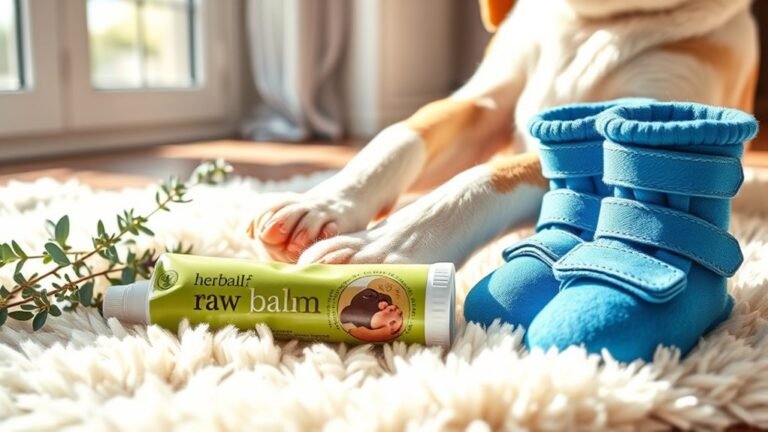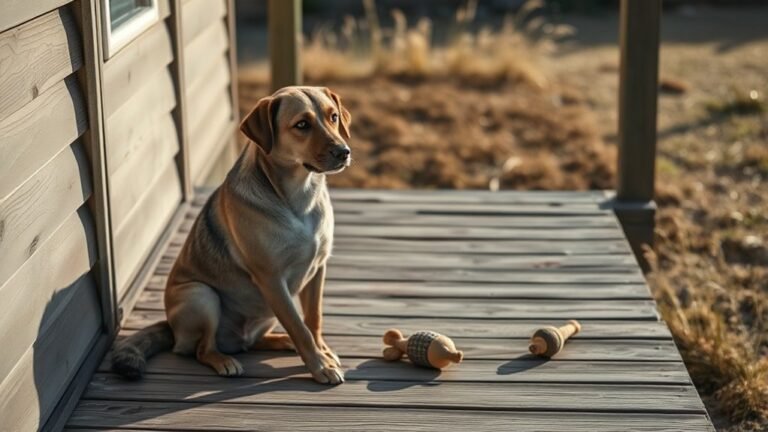How to Get Your Puppy Used to Being Alone
Getting your puppy used to being alone can feel a bit scary, but it's something you can do! Many young dogs struggle with being on their own, so it's important to help them feel safe and comfy. Here are some easy steps to help your puppy become more independent.
First, create a cozy space for your puppy. This can be a soft bed, a blanket, or some toys they love. Make sure it feels like their own little area where they can relax.
Next, start by leaving your puppy alone for short times. You might step out of the room for just a few minutes and then come back. Gradually increase the time you are away. This helps your puppy get used to being on their own.
Use treats and praise when your puppy stays calm while alone. This teaches them that being alone is okay and can be a good thing. Always come back and give them love when you return.
Remember, patience is key. Every puppy is different, and some may take longer to adjust. Keep working with them! With time, your puppy will learn to feel safe and happy when they are alone.
Key Takeaways
- Make a comfy, quiet space for your puppy. Put in soft bedding and toys. This will help your puppy feel safe when alone.
- Start alone time with short periods in the crate. As your puppy gets used to it, increase the time slowly.
- Give treats and praise when you leave and come back to encourage calm behavior. This positive reinforcement helps your puppy feel good about being alone.
- Keep track of your puppy's actions in a journal. Look for signs of anxiety. Change your plan if needed.
- Spend time with your puppy before and after you leave. This helps build a strong bond and makes your puppy feel secure.
Understanding Separation Anxiety in Puppies
When you bring a puppy home, remember that they might feel nervous about being alone, especially at first.
It's important to understand what your puppy is trying to tell you. Look for signs like whining, pacing, or chewing on things they shouldn't. These actions can mean your puppy feels anxious when left alone.
Figuring out what makes your puppy anxious is key. It could be when you leave or loud noises outside. By knowing what causes their stress, you can help your puppy feel better.
Start by leaving them alone for short times in a cozy space. This will help them get used to being alone and feel safe. As your puppy learns that it's okay to be alone, your bond will grow even stronger.
Establish a Safe and Comfortable Space
Creating a safe and cozy space for your puppy is super important. It helps them feel calm and happy when they're home alone.
Here's how to make a nice spot just for your pup:
- Pick a quiet place in your home. Find a spot away from noise and busy areas.
- Use soft beds or blankets. Make it comfortable so your puppy can relax.
- Throw in a few toys. This will keep them busy and entertained when they're waiting for you.
- Think about using a crate. It can feel like a little den where your puppy feels secure.
Setting up a space like this helps your puppy feel safe and loved, even when you're not there.
Gradual Introduction to Alone Time
Helping your puppy learn to be alone can be a big job, but you can do it step by step. Start with short times away. Put your puppy in their crate for just a few minutes. As they get used to it, you can leave them for longer.
Give them some fun toys to play with while you're gone. This helps them learn to enjoy their own company and feel secure. Make sure their crate is a cozy spot. You can add some soft blankets or their favorite toy to make it feel nice.
When you leave or come back, keep it calm. Don't make a big fuss. This can help your puppy feel relaxed.
Use Positive Reinforcement Techniques
Positive reinforcement helps your puppy feel comfortable being alone. By giving rewards, you can teach your puppy that alone time can be good.
Here are some simple ways to do this:
- Verbal Praise: Use a happy voice to cheer your puppy when they relax.
- Treats: Give them a small treat when they stay calm and quiet.
- Fun Toys: Leave them with their favorite toys to play with while you're away.
- Cuddles: Spend time together before and after being apart. This shows your puppy they're safe and loved.
Using these easy methods will help reduce your puppy's worries and make your bond stronger. Your puppy will feel happy and secure!
Develop a Consistent Routine
Creating a steady routine is important for your puppy. It helps them feel safe when they're alone. Start by feeding them at the same times each day. This way, your puppy will know when to expect their meals. This can help reduce any worries they've about being left alone.
Make sure to add daily playtime to the mix. Having a set time for fun and exercise builds trust between you and your puppy. This also gives them a good way to use their energy. Short, fun play sessions will keep their minds busy and make them happy.
Incorporate Interactive Toys and Activities
Interactive toys and activities can really help your puppy feel comfortable when they're alone.
Keeping your puppy's mind busy can make it easier for them to be by themselves. Here are some fun options to try:
- Interactive puzzles that challenge your puppy's problem-solving skills
- Treat dispensers that reward your puppy for playing and keep them entertained
- Chew toys that let them gnaw, which is a natural behavior for dogs
- Tug toys for times when you're at home to play with them
Adding these toys to your puppy's daily fun not only keeps them busy but also helps them learn to be independent.
As they get used to playing on their own, they'll build confidence and feel better when they're alone. This can make a big difference for both of you!
Practice Short Departures
To help your puppy get used to being alone, practice short departures. Start by leaving the room for a few minutes. This helps your puppy feel good about your absence.
When you come back, give your puppy praise and a treat. This makes them happy when you're gone.
As your puppy gets comfortable, slowly leave for longer. First, try five minutes, then ten minutes, and keep going.
Always keep your goodbyes calm and quiet so your puppy doesn't feel worried. Watch how your puppy reacts and change the time if needed.
Being consistent is important. With patience, your puppy will learn that being alone is okay. This will help you both feel closer.
Avoid Overreacting to Your Departures and Arrivals
To help your puppy feel okay when they're alone, don't make a big deal when you leave or come back home.
How you act can change how your puppy feels. If you're excited or sad, your puppy might get anxious. It's best to keep it simple and calm.
Here are some easy tips to follow:
- Leave quickly and quietly.
- Don't give your puppy too much attention when you go or return.
- Use the same word or action every time you leave. This helps them know what to expect.
- When you get back, give treats or praise if your puppy did well.
Keeping things low-key can help your puppy adjust better.
Monitor Their Behavior and Adjust Accordingly
Monitoring your puppy's behavior is important when they learn to be alone. Start by keeping a journal of how they act when you leave. Look for signs like anxiety, restlessness, or signs that they're calm.
If your puppy seems upset, try to help them adjust by leaving for short times at first. You can gradually make these times longer as your puppy gets more comfortable.
When you come back, reward your puppy if they're calm. Give them praise or a treat. This helps them learn that your leaving isn't a bad thing.
Keep an eye on their behavior. If they still seem anxious, change your plans a bit. By being attentive and flexible, you can create a loving space for your puppy to start feeling independent.
Seek Professional Help if Necessary
If your puppy has a hard time being alone even after you try to help, getting professional help can really make a big difference.
Here are some options to consider:
- Professional Training: A dog trainer can show you helpful methods for leaving your puppy alone.
- Behavioral Therapy: A certified behaviorist can figure out what makes your puppy anxious and help create a plan to ease their worries.
- Group Classes: Joining a class can help your puppy meet other dogs and learn to be alone in a safe place.
- Consultation Sessions: One-on-one meetings give you special advice that fits your puppy's needs.
Getting help from a professional can give you and your puppy the support you need!
Frequently Asked Questions
How Long Does It Take for a Puppy to Adjust to Being Alone?
It usually takes a few weeks for your puppy to get used to being alone. You can help them adjust with simple steps. Try leaving them alone for short times at first. This will help them feel more comfortable and less anxious. As they get used to being alone, you can slowly increase the time. Remember, being patient and kind makes this change easier for both you and your puppy.
What Age Is Best to Start Leaving My Puppy Alone?
You can start leaving your puppy alone when they are about 3 to 4 months old. At this age, they can begin to handle short times on their own. You should do it little by little. Try leaving your puppy alone for just a few minutes at first. This helps them get used to being alone and feel safe while you're gone. Use fun toys and treats to make the time more enjoyable for them. This way, your puppy can grow up happy and confident!
Can I Leave My Puppy Alone During Potty Training?
Yes, you can leave your puppy alone during potty training. However, be careful about how they feel. Puppies can get anxious when left alone.
To help your puppy, use simple potty training methods. Start by leaving them alone for short times. Increase the time slowly as they get used to it. This way, they can feel more comfortable and have fewer accidents in the house.
Should I Provide My Puppy With a Crate When Alone?
Yes, giving your puppy a crate can be a good idea. A crate is a safe place for your puppy. It can help your puppy feel cozy and secure. When you leave, put some familiar items inside like blankets or toys. This will help your puppy relax and feel less anxious while you're away. It's a great way to keep your puppy safe and happy!
Are There Specific Toys Recommended for Keeping Puppies Entertained Alone?
When you pick toys for your puppy, think about interactive toys. These toys make your puppy think and play. Chew toys are also important. They help puppies satisfy their need to chew.
Having the right toys keeps puppies busy and helps them feel safe. You want your puppy to have fun and not get bored when they're alone. Choose toys that are easy for them to use and enjoy!







